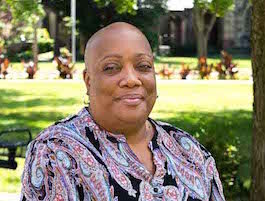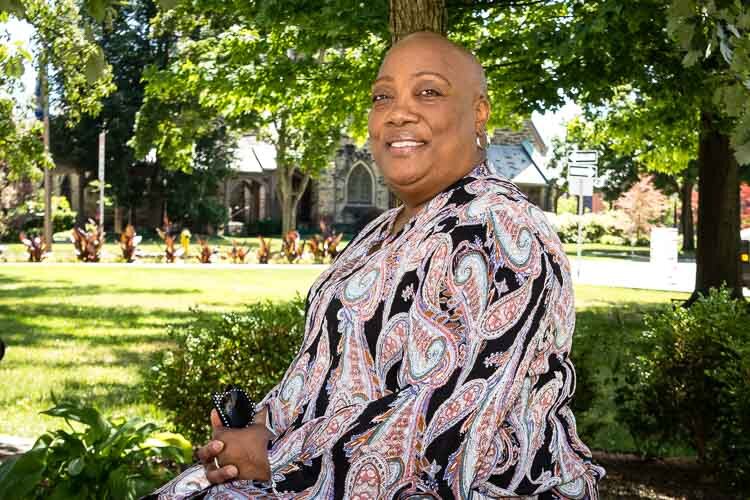Editor’s note: This story is part of Southwest Michigan Second Wave’s On the Ground Kalamazoo series.
Dorla Bonner feels she’s now in a place she’s been working toward for her entire life.
However, she didn’t pick the challenging time for her new job to start.
Bonner took the new position as the City of Kalamazoo’s director of Diversity, Equity, and Inclusion department Feb. 2.
Since then, the Black Lives Matter movement exploded on the streets, nationally and in downtown Kalamazoo, with people demanding change.
A pandemic hit Kalamazoo and the world. Then over the summer, as the call for police reform grew, there’s been an epidemic of shootings in the city’s neighborhoods.
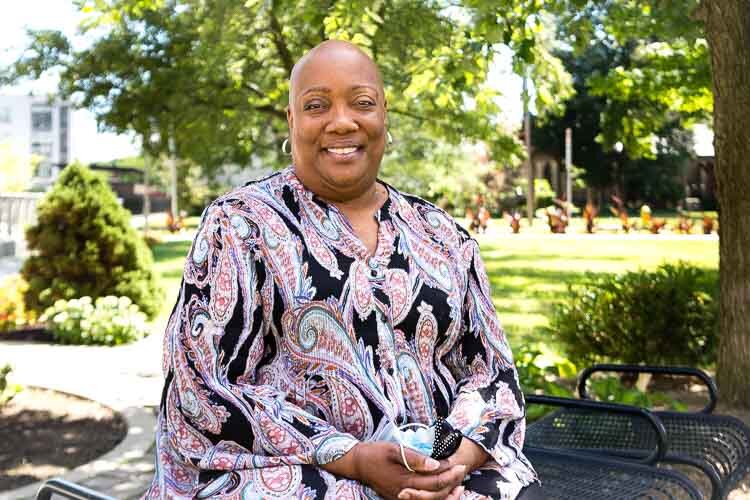
Of the new position, Bonner says, “Think about it — we’ve never done it before at the city, I’ve never done it before professionally, and we started it at probably the worst/best time we could’ve started. The best of times and the worst of times.”
COVID-19 showed disparities in the death-rates of people of color across the country. “That brought in an opportunity to have some really candid conversations about disparities in health care,” she says. “And with the George Floyd death, everything is on the table right now.”
It’s a challenging time, but events have motivated elected officials and city employees in the local government to speak honestly with her and her department. “I get to start off with a level of candor that I probably wouldn’t have had, without those things happening,” she says.
“It’s huge,” she says, that she’s able to speak openly and honestly about inequities. It’s also huge that not only are people in the city government listening, they’re also coming to her with questions on how to make people of color in the city government and among the citizens feel like they’re included at the table.
“It’s such an open topic right now…. Because of the dynamics in the country, I have an opportunity to impact things quicker than I would have, ask for things quicker, say things quicker, because I didn’t have to build up to it.”
Born in the middle of the Civil Rights Movement
Bonner has been with the city for 10 years, working in community development and investment, working at projects utilizing the Housing and Urban Development Stimulus program to boost housing in Kalamazoo, and other fair-housing projects.
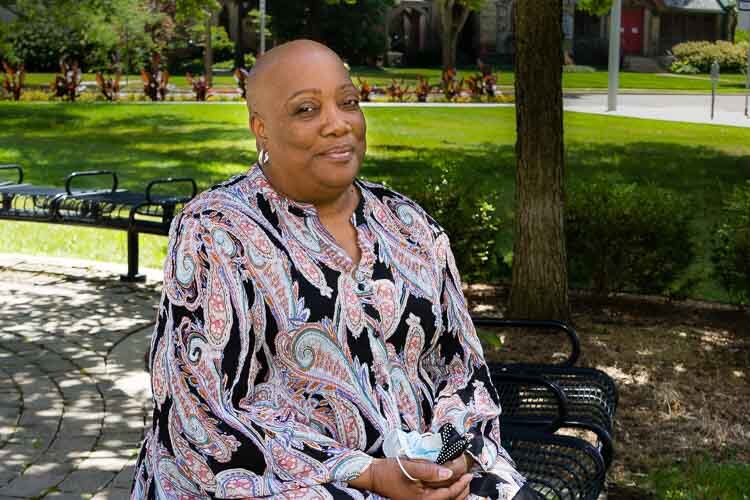
Before coming to Kalamazoo, she worked as the program manager of the Rockford, Ill., Housing Authority.
Bonner was born in Saginaw, “right in the middle of the Civil Rights movement. I was in a group of kids whose parents made them watch the protests, and made them watch Martin Luther King’s and RFK’s funerals,” she says.
“I remember the riots of ’68. I remember it vividly. I was in the first group of African American kids who started crossing the color barriers because of affirmative action in Saginaw. Raised in the tradition. My dad was a pastor, but he was an activist, so he did some protesting…. He marched by accident with Martin Luther King in Memphis. He was there for a convention, started walking, and ended up in the middle of the march. He didn’t realize he was marching!” Bonner says.
Her father made sure that Bonner and her siblings stayed aware of current events, and encouraged them to be active in trying to change society. She was a good student, and was on her way to graduating at the top of her class, when she enrolled in a program at General Motors, involving high school students working with engineers. “It was a horrible experience for a 16-year-old with a bunch of white engineers.”
The experience showed her what it was like to be at the table, but not included in the actual work. “They paid me well, and I was there. It was diverse, and it was equitable, but it wasn’t inclusive, and it was a horrible experience.”
After graduating from Saginaw, she went to Western Michigan University to study engineering. “Not many black students there in the late ’70s when I came here. I studied engineering, so there were fewer black students and almost no black women.”
She nearly flunked out her first year, because, she realized, though her high school put her at 22 out of 372 students, the school was underfunded and in a black neighborhood.
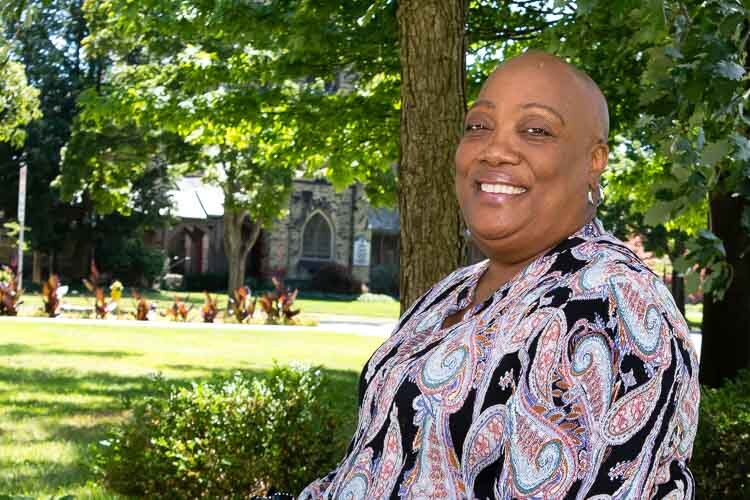
“I was pretty good! But still I almost flunked out of Western because somewhere I did not get what my white counterparts got, even though our transcripts looked the same.”
Bonner gravitated towards government work. She recalled 1991, after she’d just moved to Peoria, Ill., and was applying for a job with the state in Springfield. To apply, she had to take a drive, alone, through rural Illinois. White acquaintances had told her that the national head of the KKK lived in the area. They told her to make sure she had food and a tankful of gas, told her, “Do not stop anywhere.” She had a migraine when she arrived, “because I was petrified.”
These and other experiences made her realize that laws had changed, and there were some efforts pushing for equity, yet a culture of systemic racism lived on. “As my dad used to say, ‘Jim Crow is dead, but Jim Crow Jr. is alive, with a PhD.'”
“I can’t change your heart….”
In her new position as director of DEI, Bonner hoped to first conduct an equity survey with the city, to have an independent outside organization do interviews with everyone from the city commissioners to the staff, and to also include community members. All participation would be anonymous and private, to keep replies honest.
Then COVID-19 came along, so she is now planning to do the survey this fall.
To be effective, she needs “data and proof,” she says, explaining the need for the survey results.
“I can’t change your heart, because it (racism) is a heart thing, how you feel about people, and how you feel about yourself. But we can give you enough information to know that your heart can be changed, when you decide.”
Something else she wants changed is the culture of systemic racism.
“Culture eats policies for breakfast,” has become a phrase stuck in her mind. The laws of the country and the policies of city government may have changed since the Civil Rights movement, but a culture of systemic racism guides how those laws and policies are enforced.
For example, “There’s probably not a police department in this country that doesn’t have inequities in their arrests. And that’s obvious because of who’s in jail,” she says. “It’s not just the police, it’s the court systems, it’s the prison systems, it’s all of it.”
This is because of the culture embedded in systems and organizations, Bonner says.
‘We’re only one system’
Also on Bonner’s radar is the upcoming city commission vote on changes to Kalamazoo’s housing ordinance. She says it should be before the commission in September.
Bonner has long worked on issues around housing with community organizations including ISAAC and TRHT Kalamazoo, she says. “They are key to our community because of what they do.” She also credits Vice Mayor Patrese Griffin with “the body of work” in the housing ordinance change.
Because of ISAAC and TRHT — along “with most of the major organizations having a position such as mine led by people of color, and all of our colleges are led by people of color,” she says — “We have an opportunity to really impact systems in a way that we’ve never have in the past.”
Even so, the city government by itself cannot fix all inequities in Kalamazoo housing, Bonner says. “I think the city government is an easy target because we’re the most visible and we impact so many pieces of life….”
But, “we’re only one system,” she says.
“It’s just very challenging because the onus for the housing for the community is put on the city. And we’re only a part of the process,” she says.
“We don’t provide housing, we’re not landlords, we’re not housing organizations. We’re not banks who give or don’t give financing, we’re not realtors who show housing or steer people away from houses….”
Bonner asks those who want change in Kalamazoo’s housing to also “look at the rest of the continuum…. We have to keep pushing and holding everybody accountable,” she says.
“In the core of it, though, we have what we need here in our community to really impact things and to become a model of the work for equity.”
The need for reform, the need for safety
“When I was hired, it was a given that we needed to review the policies with the police.”
That was in February. On May 25, George Floyd died under the knee of a police officer in Minneapolis, protests hit the streets in the following weeks, and KDPS used tear gas on people downtown, so this task moved up her list.
“My role is to hire independent investigators to look at the use of force towards the protests. Also to start a review of the policies from an equity lens. And lastly, to work with the department on equity training and implicit bias,” she says.
“That’s where CPSRAB has come in.” She has met with the Citizens Public Safety Review and Appeal Board early August, “and they have agreed to support the work around finding the independent investigator.” The board will help with the selection, and also work directly with the investigators.
After these steps, “we still have in our action plan to review more of the policies.” Bonner has been talking to other cities around the state, looking at their policies around policing. “I’ve shared some of those with folks on staff, just to find out how we can get things done sooner rather than later, while not compromising quality and systemic change.”
Working at changing local policing “is very complicated, because it’s a system that is steeped in a union contract, and that is a dilemma because you don’t arbitrarily change union contracts…. I understand that coming from Saginaw, Flint and GM-land,” she says.
“Some of the things that folks want CPSRAB to do, that they would like to see happen, are in violation of the union contract.” She is looking at local policing with a realistic eye, “We can’t do that, but we can do this.”
After a rash of shootings and gun deaths over the summer, people also realize, “We need the police,” she says.
The violence leaves her “heartbroken,” Bonner adds.
For some, a need for effective policing seems to be in conflict with calls for police reform, often argued as an “either/or” situation, Bonner says.
“How do you have a conversation on making the system better, while acknowledging that we need (police)?” she asks. “It has to be explained that we’re not saying, ‘get rid of the police in Kalamazoo.'”
“How do we make sure we have a systemically sound, sensible system, department, while acknowledging there’s a lot of danger and people are hurting. It’s a complicated conversation because it can be polarizing. It’s either-or — but it can’t be either-or. This is another area where it has to be ‘and.’ We need reform and we need safety. How do you do that?”
Is it a reasonable question, that if the police are seen as responding to communities in an unequal way, could that be why some communities aren’t going to work with the police when trouble hits those same communities?
This lack of trust in the police from communities of color is the situation all over the country, Bonner says — they say, “If I don’t trust the system, why am I going to tell you?”
“We need to work hard so all of our systems treat people equitably,” she says. “But at the same time, there’s not a system that’s inequitable that we can just get rid of. We can’t get rid of the courts–” courts and sentencing data show inequities, too, in how blacks are tried and convicted compared with their white counterparts, she points out. “But at the same time, you can’t get rid of the courts, you can’t get rid of the prisons,” she says.
“It’s an unhealthy relationship to not like the police, and to need the police. It’s conflicting, that’s what I mean.”
Impacting systems
Her new department will cause change, and Bonner predicts that “some of the changes will not be big, they will not be obvious, and they won’t make people excited. But they will be substantial because they will be impacting systems.”
What she hopes to do is to change a lack of communication, and the type of communication, in the city organization, and between the city and its citizens.
Bonner is seeing progress in that people are coming to her and her department. “And these are commissioners, staff, white leaders, black leaders. They’re using the department to the extent that we already know we’ve got to staff-up. And that’s huge.”
It’s a “huge” change, she says, when she now has long talks with the mayor, when she calls commissioners about issues, when she’s asked, “Can you let me know if this doesn’t sound right?”
“It’s a huge thing that we’re having conversations,” she says.
There are three obvious goals of her department — it’s all in its name, Diversity, Equity and Inclusion.
But people have asked her what it all means. Bonner replies, “It’s one thing to be diverse, to get a lot of different people in a room. It’s one thing to be equitable, you can basically give them all the same things. The last thing is inclusiveness — do they feel like they’re a part of it? Do they feel like they’re a part of the team?”
She continues,”that last thing, that inclusiveness, that’s a hard one, because now you’re getting more into matters of heart. ‘I have you here, I’m treating you right, but I’m not letting you at the table.’ That’s why you’ll hear black people say, ‘I don’t need your table, I’ll make my own table.'”
“We’re not just asking to be at the table…. we’re asking to be included as a vital part of the conversation and the work. And that’s a hard one, but it’s important.”
What others say
Dr. Charlae Davis, executive director of ISAAC, on Dorla Bonner:
“I have had the privilege of knowing Dorla for over 30 years. She was a college student in the church I was born and raised in, Tabernacle Church of God in Christ,” Davis says.
Bonner has, since its beginning, been a member of the ISAAC and TRHT Housing Task Force, as well as a “a part of our ISAAC Family, and has served as a speaker as well as the ISAAC singers’ choir director at numerous ISAAC events. She is a huge supporter of our work in word and deed.”
She “understands the power and importance of sincere collaboration and community members having their voices heard and having the power to enact change,” Davis says.
“I wholeheartedly believe Dorla will make a difference! I was excited when the city’s new Director of Diversity, Equity and Inclusion was announced. This position, especially being a new one, needs someone innovative, who thinks outside the box, is open-minded, hardworking, dedicated, who listens, who is courageous and willing to speak the difficult and necessary truth about current systems. Someone who encompasses strength to move on the changes needed, while enacting accountability to ensure rooted impacts for generations to come. Dorla encompasses all these attributes and more!” Davis says.
“I look forward to Dorla continuing to have the needed, yet difficult, conversations within the city of Kalamazoo as an institution and within Kalamazoo as a community…. Her professional work, education, as well as her personal experiences as the daughter of Civil Rights clergy leaders, and experiences growing up and becoming a Black Woman Leader in a society filled with racism and sexism has prepared her for this work.”
“ISAAC talks many times about the Beloved Community. A place Dr. King spoke of where practices and policies are infused with love, equity, and abundance. Where all people are held as Beloved. Dorla believes this Beloved Community is possible. She understands the urgency of this work, that authentic Diversity, Equity, and Inclusion can help to build this Beloved Community and that DEI is transformational work. We stand with Dorla and look forward to the awesome work she continues to do to impact our Kalamazoo Community,” Davis says.
Laura Lam on Dorla Bonner:
As deputy city manager, Laura Lam was “part of the conversation” to create the City of Kalamazoo’s Diversity, Equity and Inclusion department.
“I had the privilege of hiring her into the city,” Lam says. Bonner was a community development compliance specialist, joining the city in 2010. “We were working closely together on the neighborhood stabilization program, the stimulus funding that came fast and furious to the city,” Lam says. “It was very clear in a very short period of time how valuable she was to the team, and we worked quickly to figure out how to get on-going funding to support her and her position.”
One quality that Lam appreciates “is her sense of humor, and how she’s able to stay positive even when we’re facing extremely challenging work, so she and I have this history of finding, in the most challenging moments, the opportunities to laugh and just lighten-up so we can keep doing the work.”
But Bonner is 100% serious about her mission. “I see her as an inside organizer, committed to doing the hard work of trying to change the city from within. That can be a tough role to play,” Lam says.
“She just has that instinct of knowing what’s needed to communicate the most critical information in a way that people are going to be able to hear it, to listen to it, and I think because it’s coming from her, she commands respect and trust, and people are willing to go with her on it.”

